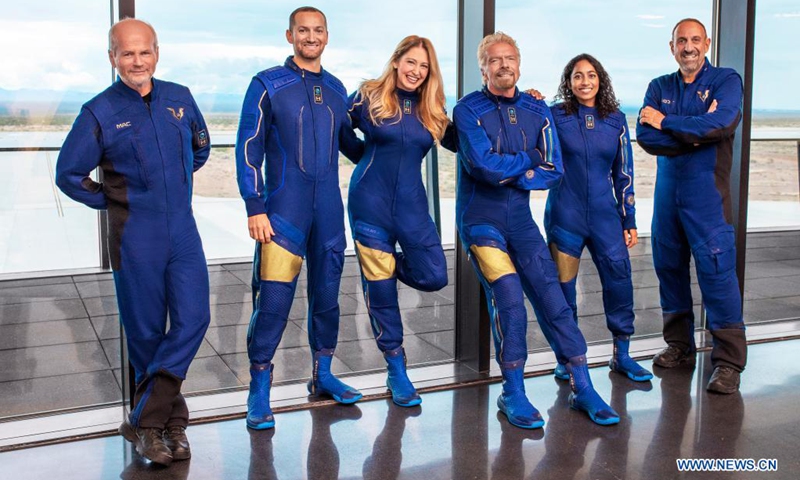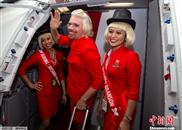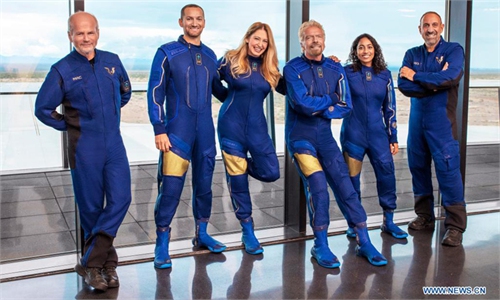Environmental concerns grow among scientists as space tourism lifts off
Billionaires under fire over carbon footprint

Photo released by Virgin Galactic on July 1, 2021 shows Virgin Galactic "Unity 22" crew (from L to R) chief pilot Dave Mackay, lead operations engineer Colin Bennett, chief astronaut instructor Beth Moses, founder of Virgin Galactic Richard Branson, vice president of government affairs and research operations Sirisha Bandla, and pilot Michael Masucci, posing for a photo in the United States.(Photo: Xinhua)
After years of waiting, Richard Branson's journey to space this month on a Virgin Galactic vessel was supposed to be a triumphant homecoming. Instead, the jaunt attracted significant criticism about its carbon footprint.
With Jeff Bezos set to launch on a Blue Origin rocket on Tuesday, and Elon Musk's SpaceX planning an all-civilian orbital mission in September, the nascent space tourism industry finds itself facing tough questions about its environmental impact.
Right now, rocket launches as a whole don't happen often enough to pollute significantly.
"The carbon dioxide emissions are totally negligible compared to other human activities or even commercial aviation," NASA's chief climate advisor Gavin Schmidt told AFP.
But some scientists are worried about the potential for longer term harm as the industry is poised for major growth, particularly impacts to the ozone layer in the still poorly understood upper atmosphere.
Virgin Galactic, which came under fire in op-eds on CNN and Forbes, as well as on social media, for sending its billionaire founder to space for a few minutes in a fossil fuel-guzzling spaceship, says its carbon emissions are about equivalent to a business-class ticket from London to New York.
The company "has already taken steps to offset the carbon emissions from its test flights and is examining opportunities to offset the carbon emissions for future customer flights, and reduce our supply chain's carbon footprint," it said in a statement to AFP.
But while transatlantic flights carry hundreds of people, Virgin's emissions work out to around 4.5 tons per passenger in a six passenger flight, according to an analysis published by French astrophysicist Roland Lehoucq and colleagues in The Conversation.
That's roughly equivalent to driving a typical car around the Earth, and more than twice the individual annual carbon budget recommended to meet the objectives of the Paris climate accord.
"The issue here is really one of disproportionate impacts," Darin Toohey, an atmospheric scientist at the University of Colorado, Boulder, told AFP.
"I actually grew up on the space program and that got me into science.... but if someone offered me a free ride, I would be very nervous taking it because I would know that my own footprint is way larger than it should be," he said.
Virgin Galactic's SpaceShipTwo uses a type of synthetic rubber as fuel and burns it in nitrous oxide, a powerful greenhouse gas.
The fuel pumps black carbon into the upper stratosphere, some 30-50 kilometers high.
"We could be at a dangerous point," said Toohey, .
Virgin has said it wants to conduct 400 flights a year.
AFP



